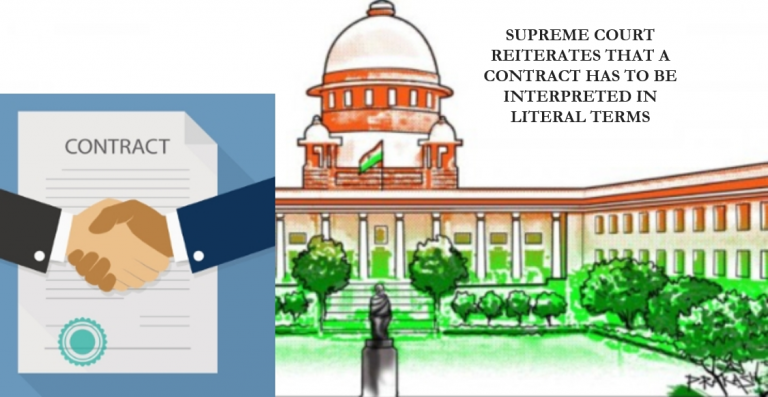SUPREME COURT REITERATES THAT A CONTRACT HAS TO BE INTERPRETED IN LITERAL TERMS
The Hon’ble Bench of the #SupremeCourt on India in the case of <strong><em>Bangalore Electricity Supply Company Limited (BESCOM) versus E.S. Solar Power Pvt. Ltd. & Ors. [CA No. 9273/2019]</em></strong>, vide its Judgment dated 03.05.2021 reiterated that a liberal or a narrow approach cannot be adopted to construe a #contractual clause in an #agreement. A contract has to be read literally and the #court cannot interpret the contract.
In this case, the Karnataka Renewable Energy Development Limited (<strong>KREDL</strong>) issued a Request for Proposal on 20.11.2015 to bidders for undertaking development of Solar PV ground mount Power Plants through Private Sector participation. In this regard, the Power Purchase Agreements (<strong>PPAs</strong>) were entered into between the Bangalore Electricity Supply Company Limited (the “<strong>Appellants</strong>”) and E.S. Solar Power Pvt. Ltd. and other parties (the “<strong>Respondents</strong>”) on 23.05.2016. The Projects for development of Solar PV Ground Mount Power Plants of 1200 MWA of Solar power were awarded to the Respondents. The said PPAs were approved by the Karnataka Electricity Regulatory Commission (the “<strong>Commission</strong>”) on 17.10.2016. As per the PPAs, the Scheduled Commissioning Date for the Solar Projects was to mean 12 months from the effective date.
The Appellants had imposed damages and reduced tariff due to delay by the Respondents in commissioning of the Project i.e. on 16.10.2017 as per the PPAs. According to the Appellants if 17.10.2016 is included in computation of 12 months (365 days), the Scheduled Commissioning Date is 16.10.2017. On the other hand, the Respondents contended that 17.10.2016 should be excluded in the calculation of 12 months (365 days), in which case, 17.10.2017 would be the Scheduled Commissioning Date.
As a result, the Respondents filed an Original Petition (OP) No. 18 of 2018 against the imposition of damages of Rs. 20,00,000/- (Rupees Twenty Lakhs only) for delay in commissioning the Project before the Commission. Another Original Petition No. 19 of 2018 was also filed seeking similar reliefs to those claimed in OP No. 18 of 2018 before the Commission. However, the Commission, vide its Order dated 23.10.2018 dismissed both the Original Petitions deciding in favour of the Appellants.
The Respondents filed an Appeal against the Commission’s Order dated 23.10.2018 before the Appellate Tribunal for Electricity at Delhi (“<strong>Appellate Tribunal</strong>”). The Appellate Tribunal allowed the Appeal and set aside the Order passed by the Commission. It held that the date of the event which is the date on which the PPA was approved i.e. 17.10.2016 shall be excluded in calculating the period of 12 months. Therefore, the Project was commenced within the time limit prescribed under the PPAs.
The Appellants have filed two separate Appeals before the Supreme Court of India against the Order of the Appellate Tribunal for Electricity. The Supreme Court while considering the dispute related to the computation of the date observed that the literal interpretation of the agreement is necessary to decide the conflict between the Parties.
The Supreme Court observed and held as follows:
<strong>1)</strong> To construe a clause in a Contract, there is no scope for adopting either a liberal or a narrow approach. The exercise which has to be undertaken is to determine what the words used mean.
<strong>2)</strong> The intention of the parties must be understood from the language they have used, considering the surrounding circumstances and object of the contract. The whole context must be considered in endeavoring to collect the intention of the parties, even though the immediate object of inquiry is the meaning of an isolated clause.
<strong>3)</strong> The Court referred to the broad principles of interpretation of contract in the case of <strong><em>Investors Compensation Scheme Limited vs. West Bromwich Building Society</em></strong> [1998 (1) AIR 98] and pointed out the following principles:
<em><strong>i)</strong> Interpretation is the ascertainment of the meaning which the document would convey to a reasonable person having all the background knowledge which would reasonably have been available to the parties in the situation in which they were at the time of the contract.</em>
<em><strong>ii)</strong> The law excludes from the admissible background the previous negotiations of the parties and their declarations of subjective intent. They are admissible only in an action for rectification. The law makes this distinction for reasons of practical policy and, in this respect only, legal interpretation differs from the way we would interpret utterances in ordinary life. The boundaries of this exception are in some respects unclear. But this is not the occasion on which to explore them.</em>
<em><strong>iii)</strong> The “rule” that words should be given their “natural and ordinary meaning” reflects the common sense proposition that we do not easily accept that people have made linguistic mistakes, particularly in formal documents.</em>
<strong>4)</strong> As per the clauses of the PPAs dated 23.05.2016 liquidated damages could be imposed on the Developer if he is unable to commence supply of power to the Appellants by the Scheduled Commissioning Date. The Commission approved the PPAs on 17.10.2016. According to the Agreements, the Scheduled Commissioning Date should be 12 months from the effective date i.e. 17.10.2016.
<strong>5)</strong> The Court interpreted the meaning of the term ‘Month’ under the Agreements as an essential part and it observed that the crucial expression in the definition of ‘Month’ is “excluding the date of the event”. If the date of the event i.e. 17.10.2016 is excluded, the Scheduled Commissioning Date would be 17.10.2017.
In view of the above, the Supreme Court upheld the decision of the Appellate Tribunal and held that the Court is not to delve deep into the details of human mind to explore the undisclosed intentions, but only to take the meaning of words used in the contract i.e. to say expressed intentions.
<strong>Lakshmi Vishwakarma</strong>
<strong>Senior Legal Associate</strong>
<strong>The India Lawyer & Allied Services </strong>





































Leave a Reply